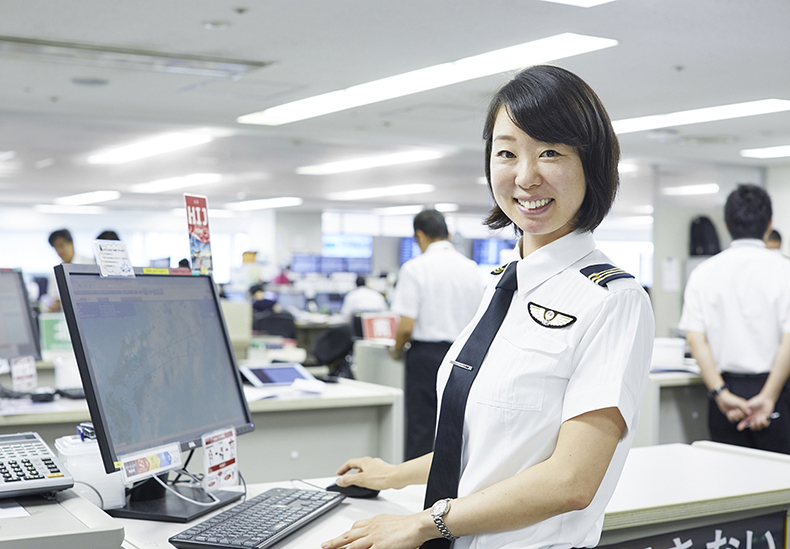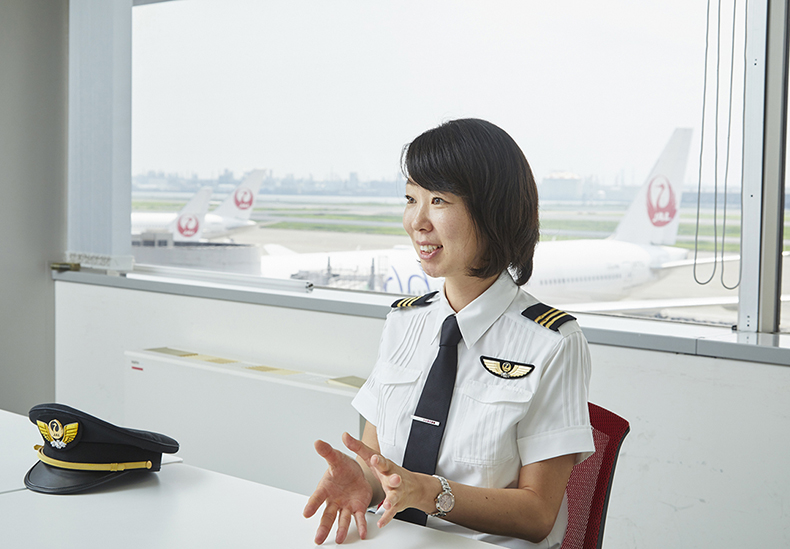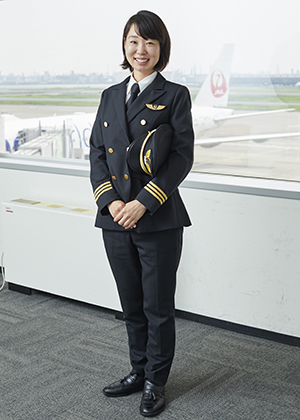Flight Operations, Boeing 737 Flight Crew Office, First Officer Japan Airlines Co. Ltd.
2008 B.A., Division of Education (then), College of Liberal Arts

It all started with a yearning to see views from the cockpit
I aspired to become a pilot out of a pure desire to "watch the skies from the cockpit." It was when I was a third-year student that this vague aspiration turned into my goal. I had an opportunity to hear a story from an ICU graduate who had been selected as JAL's pilot trainee.
And in February this year, I was finally able to get the license and in-house qualification necessary to fly as a pilot. Today, I am working as a copilot onboard Boeing 737s on domestic flights. The training was hard, but I feel that I am spending the most rewarding time of my life at present.
But I don't mean to say that my life has been all smooth sailing until now. My most serious setback came in 2010 when JAL had to downsize its business drastically because of bankruptcy proceedings. The company found it necessary to halt its pilot training program as a result of a decline in the number of pilots it needed. My path to becoming a pilot had been blocked, forcing me to make a very hard decision on whether to remain with JAL as a clerical staff member with a Managerial career track position or to move to another company. Other aspiring pilots faced the same situation. They went through difficult days trying to figure out how they could carve out their future. For my part, I felt it would be difficult, because of my age, to take on the challenge of becoming a pilot even if the training program resumed. I was so frustrated because I could do nothing about the situation despite the fact that I joined the company to become a pilot; I was unable to immediately come to terms with my feelings.
But I thought things through, considering what I really wanted to do with my life. While I was trying to find a job in my college days, I had the conviction that I would join a company which I would really love and to which I would dedicate my entire life. I chose, therefore, to stay with JAL, a company I joined after careful consideration and after fully satisfied with my decision, as a generalist. It is true, of course, that I, at the time, envied those who were already working as pilots. I had no regrets, however. It was a heart-rending decision I made on my own.

Joy after overcoming a setback, and bond with my colleagues
A turning point came on Oct. 10, 2012. As the company tried to rebuild itself, it also reassessed the pilot training program and announced the decision to resume the training it had halted in 2010. And I was chosen as a trainee in the first class of the renewed program. I still remember feeling that, while I was grateful to the company for selecting us, my own decision to remain with JAL saved me and my future.
When the resumption of the program was announced, the first thing that came into my mind was the faces of my colleagues who, like me, had been waiting for this day. After joining JAL, 60 aspiring pilots are divided into ten groups and work as ground crews for one year. I was assigned to Itami Airport in Osaka and talked almost every day with my five colleagues after work about the hopes and dreams of becoming a pilot; still, just when training in the United States was about to begin, the program was brought to screeching halted . All six of us remained with the company and continued to work at our respective offices as staff members with Managerial career trackpositions. And then came the announcement on the resumption of the training program. My heart leapt with joy at the news I had been awaiting for a long time without giving up hope. Within the same day, all of us got in touch with each other and shared the joy of being able to pursue our dreams together again.
It was in large part because these friends were right there with me that I was able to successfully complete the rigorous training. JAL's program is known especially for its high quality. We have to acquire high-level technique and knowledge in a limited amount of time. I was sometimes worried if I could keep up with the others. Even so, I always drew strength and encouragement from watching them do their best to rise above their challenges. I was filled with deep emotion when we made progress in our training and flew the training plane in pairs, teaming up with those in the same class who had also experienced the suspension of the program.

My days at ICU that made me what I am today
Looking back, I think it was because of the habit of critical thinking I gained during my days at ICU that I was able, without being over influenced by the opinions of others around me, to come up with the convincing answer when I had to make the decision on whether to remain with the company doing general work or to quit and find another job. I always made it a rule to look at things critically when I had discussions with the members of my ELP class (current ELA) and my club, as well as those who were taking the Teacher Certification Program together. This attitude, I think, enables me even today to stop and ask myself spontaneously, "Is this really right?" without depending on the thoughts and opinions of people around me. Especially, the ELP class left me with a strong impression. I felt the fact that there is a class (or section) we can belong to in college gives a sense of relief to us all.
*At ELA, students belong to a small-size class of about 20 members, which is called section.
Let me talk about another attractive aspect of studying at ICU. It is that the university puts emphasis on liberal arts. For me, the experience of having been able to study broadly without narrowing down my area of specialty proved extremely valuable. When I enrolled at ICU, I was interested in psychology. Later, however, I also became interested in working as a teacher. I had so many opportunities to discuss a variety of topics with my friends pursuing wide areas of study, which sometimes confused me in a good way, letting me wonder what my major really was. The friends I still keep in touch with are in truly diverse lines of work, such as teachers, secretaries as well as planners of academic meetings and other events. It was precisely the environment like this that motivated me to hope seriously to work in the aviation industry.
Including during training periods, majority of my coworkers are men. But I have almost never felt uncomfortable. This is, of course, due in part to the fact that my male colleagues are considerate but I also think that the sensibilities I cultivated during my days at ICU are also playing a part. On campus, we always respected others as individuals whether they were men or women. We were never seriously conscious of gender differences in student life. I think it was also ICU's another great charm that we treat others as individual human beings regardless of their places of birth or their gender.
Unforgettable tears offlight instructor captains; Always hoping to be a person who can do one's best
We are entrusted with the lives of many people in our job. We have to meet extremely stringent physical and technical standards in order to sit in the cockpit. We have to take tests and physical examinations regularly. We may sometimes have our licenses suspended the very day we are found falling short of the standards. I will, of course, continue to try not only to maintain my qualification and to remain in top physical shape but also to become the kind of pilot who can offer yet higher-quality flights.
I have no great inconvenience to speak of, but I do feel worried and at a loss sometimes as a woman. Today, women who want become pilots are joining the company almost every year, and I am hoping there is something I can do for them as their senior. I am happy if they turn to me for advice about anything, big and small, such as problems concerning training and life as a flight crew member.
My goal in life is to become a person who can do his or her best at any given moment. When we had the training in the United States, JAL sent four chief captains as instructors. With the resumption of the training program, the company opened a new facility in the United States. I learned later that these instructors went through a great deal of trouble in the preparation for receiving us trainees, making arrangements for the training facility, contacting and negotiating with outside organizations and getting their own certificates as trainers. During the training, however, they didn't drop even the slightest hint of any of the work they had done for us. They gave top priority to us trainees, giving us friendly, if rigorous, guidance.
I cannot forget the tears the captains shed when we all safely completed our training program in the United States. In the future, the things the company requires of us may change and we may find ourselves facing situations that are different from the life plans we have envisioned. Whatever situation I may encounter, however, I hope to do my best, just as our four flight instructor captains did, with the knowledge and experience I have gained to date.
Profile
Sakura Shishika
2008 B.A. in Arts and Sciences (Education)
Following graduation from the Division of Education of the College of Liberal Arts, Ms. Shishika joined Japan Airlines Co. Ltd. as a flight crew member (a company pilot trainee). She worked as a staff member with a Managerial career track position for several years and became a copilot in February 2017, following two and a half years of training from May 2014 in Arizona in the United States and Tokyo. She flies mainly on domestic routes.




